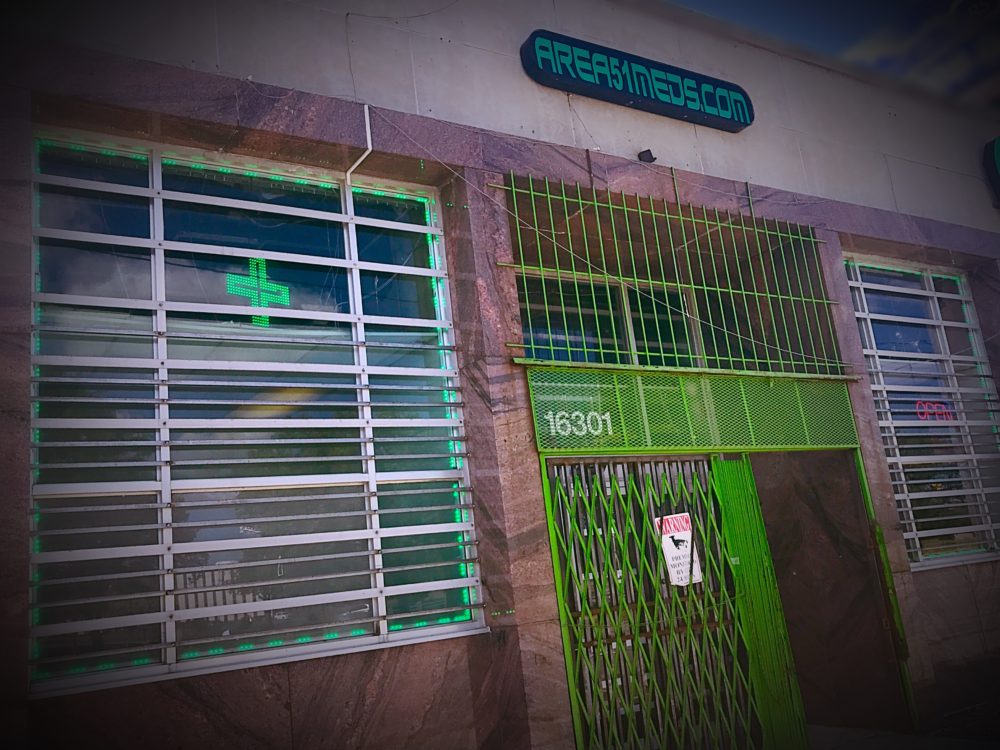
On the evening before Thanksgiving, a squad of Detroit cops in ballistic vests knocked down the door of a city-authorized marijuana dispensary and pointed guns at terrified patients and employees in a waiting room.
“This is a raid! On the ground!” police yelled inside Area 51 on 8 Mile near the Southfield Freeway.
Using a battering ram, black-clad cops forced their way into the cannabis room and seized surveillance equipment, TVs, a cash register, 508 edibles, 72 plants and 58 gallon-size ziplock bags of medical-grade marijuana.
Police handcuffed five patients, a handful of employees and a medical marijuana doctor – 11 in all – before transporting them to an unidentified garage lined with chairs and tables on the city’s west side. Police then searched each of them, seized their personal cash and issued a misdemeanor ticket for allegedly loitering in a place of illegal occupation, a crime punishable by up to 93 days in jail. Facing them was a whiteboard, describing DPD’s “Zero Tolerance” program, that read, “We know there are murderers and rapists out there but tonight we got you. You may be asking yourself why you are here, but you caused this.”
 More than three hours later, they were hauled off to the Detroit Detention Center, where they were fingerprinted, photographed and jailed until early Thanksgiving Day.
More than three hours later, they were hauled off to the Detroit Detention Center, where they were fingerprinted, photographed and jailed until early Thanksgiving Day.
But none of it should have happened.
buy alesse online cialisnextdaydeliveryusa.com/alesse.html no prescription
After approving an ordinance limiting where dispensaries could operate in 2015, Mayor Duggan’s administration assured medical marijuana cardholders they were permitted to buy cannabis at dispensaries that were either licensed by the city or were in the process of getting approval. Area 51 was awaiting approval and therefore allowed to operate.
But that information either didn’t get to police – or the cops simply ignored it.
Jordan Zuppke, an attorney for a patient who was bruised when a cop shoved her into a chair, said the loitering tickets violated the rights of those arrested.
“People were unlawfully arrested and ticketed for loitering in a place where ‘illegal’ controlled substances are sold,” Zuppke said. “Whoever authorized this raid doesn’t understand the marijuana laws. While these laws are complex, the complexities cannot justify robbing people of their freedom.”
Responding to questions for this story, the Detroit Law Department acknowledged police should not have arrested patients and pledged that dispensary patrons won’t be ticketed in the future as long as they are in a dispensary authorized by the city. Here’s a map of the authorized dispensaries.
But that doesn’t explain why the law department’s own prosecutors continued to press forward with most of the cases in court. Those who were ticketed waited hours for court hearings, sometimes for a judge who never showed up. Some tickets weren’t dismissed until cops failed to appear in court. In at least one case, Stephan Morgan, a relentless city prosecutor, refused to dismiss the charges, but when he didn’t show up to a hearing, another prosecutor dropped the case.
buy alphagan online cialisnextdaydeliveryusa.com/alphagan.html no prescription
The law department tossed the final cases more than 4 months after the raid.
“The City of Detroit Law Department dismissed all of these tickets for a reason, because they knew what happened was illegal,” Zuppke said.
DPD spokesman Michael Woody insisted today that he could not remember another raid in the past year in which patients were arrested and jailed for being inside a city-authorized dispensary. He said it’s unclear why police issued the tickets in the Area 51 raid.
“We have a very fine line we are walking,” Woody said. “We don’t want to mess with people’s medicine.”
Area 51 was raided because police were tipped off that the dispensary allegedly had an excessive amount of plants, which wasn’t confirmed during the raid, according to the police report. The case is still under investigation, police said.
The city has ordered more than 200 dispensaries to close in the past year and a half because they either failed to apply for a license to operate or were in violation of the ordinance, which generally prohibits shops from opening within 1,000 feet of a liquor store, park, church, school, library, arcade or daycare center. Some dispensaries that were denied a license continue to operate.
There currently are 78 city-authorized dispensaries. Only five have been approved, while the remaining 73 are in the permit process. An additional 70 dispensaries that have not yet opened are seeking approval to operate.
buy amaryl online cialisnextdaydeliveryusa.com/amaryl.html no prescription
The licensing process involves onsite inspections, security plans, building permits and a city analysis to determine whether the dispensaries are within 1,000 feet of the prohibited establishments like schools and churches. A dispensary may ask the Board of Zoning Appeals for a variance to operate within 1,000 feet of those establishments under special circumstances.
The raid was carried out by a narcotics team in the Eighth Precinct.
Although the cases were dismissed, the Detroit Police Department’s forfeiture division has not returned everyone’s seized property. Police seized $500 in cash from Zuppke’s client, a local producer who planned to deposit the money for rent. Under the state’s controversial forfeiture laws, police are allowed to seize money and property from an alleged drug suspect without due process.
To be eligible to recover her seized property in the event of a dismissal, the valid medical marijuana cardholder was required to pay a $250 bond within 14 days of the raid. But now, she says the forfeiture division has claimed they don’t have her paperwork, and the law department has not returned her calls.
Maria Miller, a spokeswoman for the Wayne County Prosecutor’s Office, said it can take months before the police department returns the money.
Frustrated but determined to get her money back after the traumatic experience, the local producer is now considering filing a civil suit against the city.
“The only way to combat the abuse of power is to speak up against it,” she said.
Motor City Muckraker is an independent watchdog funded by donations. To help us cover more stories like this, please consider a contribution.
Steve Neavling
Steve Neavling lives and works in Detroit as an investigative journalist. His stories have uncovered corruption, led to arrests and reforms and prompted FBI investigations.
